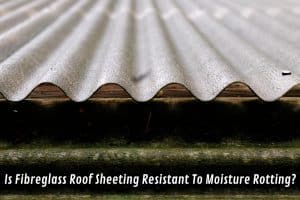For more information on any of the services offered by High Class Roofing or a free no obligation quotation, please complete the following form or call us on 0405 229 765.
Is Fibreglass Roof Sheeting Resistant To Moisture Rotting?

If you’re looking for a durable and reliable roofing solution, fibreglass roof sheeting is a popular choice for many property owners. It offers many benefits, including its lightweight properties, easy installation, and excellent resistance to a variety of environmental factors. One important question that many people ask is whether fibreglass roof sheeting is resistant to moisture rotting.
In this blog post, we’ll explore this topic in detail, examining the factors that can impact the resistance of fibreglass to moisture rotting, how they resist moisture rotting, and the recommended maintenance and care procedures to keep your fibreglass roof in top condition. So, if you’re considering fibreglass roof sheeting for your building, keep reading to learn more about its resistance to moisture rotting.
What are the advantages of using fibreglass roofs?
There are several advantages of using fibreglass roof sheeting:
- Durability: It is incredibly strong and durable. It can withstand harsh weather conditions, including extreme temperatures, wind, and rain, without becoming damaged or degraded.
- Lightweight: Fibreglass roof sheeting is lightweight, making it easy to handle and install. This can also reduce the load on the structure, which can be especially important for buildings with weight restrictions.
- Versatility: It can be used in a wide range of applications, including industrial, commercial, and residential. It is also available in different colours and finishes to suit different aesthetic preferences.
- Low maintenance: It requires very little maintenance, other than occasional cleaning. It does not rust or corrode, and it is resistant to algae and moss growth.
- Energy efficiency: Fibreglass roof sheeting can help to reduce energy costs by reflecting sunlight and heat. This can help to keep buildings cooler in summer and reduce the need for air conditioning.
- Cost-effective: It is generally less expensive than other roofing materials, such as metal or tile. It is also relatively easy to install, which can reduce installation costs.
How does fibreglass roof sheeting resist moisture rotting?
Fibreglass roof sheeting resists moisture rotting due to its inherent properties and the way it is manufactured. Fibreglass is made by combining glass fibres with polyester or epoxy resin to create a strong, durable material that is resistant to moisture and rot.
The glass fibres used in fibreglass are extremely strong and do not absorb water. This makes fibreglass inherently resistant to moisture damage and rot. Additionally, the polyester or epoxy resin used to bind the fibres together is water-resistant, which further helps to prevent moisture damage.
During the manufacturing process, the fibreglass material is typically cured at high temperatures, which helps to harden the material and make it less susceptible to moisture damage. The material is also coated with a layer of gelcoat, which provides an additional layer of protection against water and other environmental factors.
Finally, it is designed to allow water to flow off of the roof and away from the building. This helps to prevent water from pooling on the roof, which can lead to moisture damage over time.
In summary, fibreglass roof sheeting is an excellent choice for areas with high humidity, heavy rainfall, or other moisture-related challenges, as it is highly resistant to moisture rotting and other forms of water damage.
What are the factors that impact the resistance of Fibreglass Roof Sheeting to moisture rotting?
The resistance of fibreglass roof sheeting to moisture rotting depends on several factors, including:
- Quality of materials: The quality of the fibreglass material used to make the roof sheeting can impact its resistance to moisture rotting. High-quality fibreglass materials are typically more resistant to moisture damage.
- Manufacturing process: Proper curing, for example, can help ensure that the material is fully hardened and less susceptible to water damage.
- Thickness of the sheeting: The thickness of the fibreglass roof can also impact its resistance to moisture rotting. Thicker sheeting is generally more resistant to water damage.
- Installation: Proper installation, including ensuring that the roof is properly ventilated and that water is able to drain away from the roof, can help to prevent water damage.
- Exposure to moisture: The amount of exposure to moisture can also impact the resistance of fibreglass roof sheeting to moisture rotting. If the roof is regularly exposed to moisture, such as from rain or snow, it may be more susceptible to water damage over time.
- Maintenance: Regular maintenance, including cleaning and inspections, can also help to prevent moisture from rotting in fibreglass roof sheeting. Cleaning can remove any debris or dirt that may trap moisture, while inspections can identify any potential areas of damage that may need to be repaired.
What are the recommended maintenance and care procedures for them?
Proper maintenance and care are important to ensure that fibreglass roof lasts for as long as possible and continues to perform well. Here are some recommended maintenance and care procedures for them:
- Regular cleaning: Regularly cleaning the roof surface is important to remove dirt, debris, and other materials that can accumulate on the surface over time. Use a soft brush or sponge and mild detergent to clean the surface. Avoid using harsh chemicals that can damage the fibreglass material.
- Inspections: Inspect the roof regularly to identify any areas of damage, such as cracks or holes, that may require repairs. Early detection and repair of damage can prevent further damage and prolong the life of the roof.
- Repairs: Repair any damage to the roof promptly. Small cracks or holes can be repaired using a fibreglass repair kit, which is available from most home improvement stores. Larger areas of damage may require professional repair.
- Proper drainage: Ensure that the roof has proper drainage and that water is able to flow off the roof and away from the building. This helps to prevent water from pooling on the roof and causing damage.
- Preventing damage: Take steps to prevent damage to the roof, such as avoiding walking on the roof, trimming back trees or branches that may come into contact with the roof, and keeping sharp objects away from the roof.
- Protective coatings: Consider applying a protective coating to the roof to provide an additional layer of protection against the elements. Consult with a professional to determine the best coating for your specific type of roof sheeting.
By following these recommended maintenance and care procedures, you can help ensure that your roof lasts for many years and continues to provide reliable protection for your building.
Conclusion
Overall, fibreglass roof sheeting is a highly effective product that is resistant to moisture rotting. This is due to its unique combination of composite materials, including glass fibres and a water-resistant resin. Fibreglass materials have excellent corrosion resistance and are an ideal choice for areas with high humidity or heavy rainfall. The lightweight properties of fibreglass make it easy to install and handle, and it is also commonly used in other applications such as insulation material, fibreglass doors, and fibreglass sound barriers. Regular maintenance, including cleaning, inspections, and repairs, can help to ensure that fibreglass roof sheeting remains in good condition for many years.
Looking to protect your building from moisture rotting and other water-related damage? High Class Roofing can help. As experts in fibreglass roof sheeting, we know how to provide a long-lasting and reliable roofing solution that is resistant to moisture and other environmental factors. Our team of professionals can provide you with a free consultation to assess your needs and give a complete roofing solution for your building. Whether you need installation, repairs, or maintenance, we can help you keep your fibreglass roof sheeting in top condition for years to come. So why wait? Contact High Class Roofing today to schedule your consultation and start protecting your building with the best roofing solution available.

